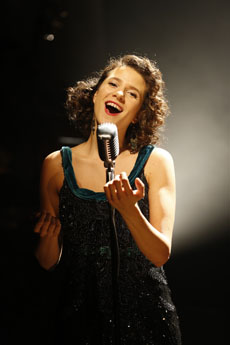Theatre in Review: Café Society Swing (59E59) |  |  | |
If you never had the chance to go slumming in Greenwich Village with high society swells, thrilling to Billie Holiday or the young Lena Horne -- and, really, who among us ever did? -- the next best thing is to check out Café Society Swing. The author/pianist/musical director Alex Webb has put together a tribute to the two nightclubs -- one in Sheridan Square and one on 58th Street -- that presented the best jazz artists of the day (1938 -1949) while challenging any number of social mores. For one thing, blacks and whites shared the stage and the dance floor, something unheard of even in supposedly progressive New York City. For another, Barney Josephson, the owner of both clubs, made no secret of his left-wing politics, which was all right as long as the war was on and Soviet Russia was our ally; in peacetime, the red baiters swarmed in, scouring the joint for traitors and giving flag-waving press jackals, such as the Commie-hunting Hearst columnist Dorothy Kilgallen, a green light to smear Josephson's name. Eventually, his brother Leon was imprisoned for contempt of court, and Zero Mostel and Jack Gilford, among other Café Society performers, were blacklisted. It was all downhill from there. We learn all of this, and more, from narration delivered by Evan Pappas, who appears first as a hack reporter looking to dish the dirt on Josephson, later as the bartender at Café Society, and finally as Josephson himself. It's an inelegant setup, to say the least, designed to deliver big blocks of exposition between numbers, and some of the jokes are pain-inducing. For example, we are told that a kitchen worker is half-black and half-Japanese, which means that "every December 7th he attacks Pearl Bailey." At moments like these, you may find yourself craning your neck, looking for the next singer waiting in the wings. Fortunately, the musical talent can't be beat. In addition to his nimble work on the electric guitar, Allan Harris uses every rasp and ramble in his voice to lend drama to "One Meat Ball," a bluesy lesson in socioeconomics about a guy who finds out exactly how much respect the 15 cents in his pocket buys him in a restaurant ; he also mines the melancholy depths of Billy Strayhorn's "Lush Life" and does well by a couple of newly composed numbers by Webb, including the tart, skeptical "Red Scare." If you're looking for sass, Charenee Wade has it to spare as she slinks through numbers like "Wild Women Don't Get the Blues" and a little item by Webb called "Bad Girls Need to Love." Wade has a nice way of looking like a wide-eyed innocent while growling the raciest lyrics, as if she simply can't believe the things the management is making her sing. She also channels the spirit of Sarah Vaughn in a lively version of "What is This Thing Called Love?" Even better is the French chanteuse Cyrille Aimée, a charmer with the air of a sweet young thing who has a pretty good idea of what goes on after the kids have been put to bed. She delivers "Stormy Weather" with a smile and a shrug, as if heartbreak were the way of the world, and she scats up a storm in a sexy little novelty ditty called "Hurry on Down." Aimée is a delightful presence who makes everything she does look easy. Pappas is on hand mostly as an actor, but he and Aimée take part in a nifty bit of erotic fencing in the number "Closing Time." Less successful is "The Investigator's Song," a Zero Mostel specialty item that tries to spoof the Red Scare and succeeds in beating a single joke to death. In any case, you have to admire Pappas' professionalism, and it's good to see him again after a prolonged absence. The principals are backed by a crack eight-person band led by Webb; they keep even the less-memorable numbers cooking and they work wonders with the evening's many gems. Café Society Swing benefits from a simple, yet classy, production design. David Woodheads set includes some attractive deco bandstands and banners that recall the caricatures of snobby patrons that decorated the walls of Café Society; he has also come up with plenty of gowns to keep the ladies looking glamorous. Maruti Evans' lighting creates some highly dramatic big-beam backlighting looks from units placed on the upstage floor. The work of audio engineer Ken Hypes creates an ideal balance between voices and musicians. Evans' lighting is used to especially dramatic effect in the final number. We are told of Café Society's shuttering in the wake of Joe McCarthy's witch hunt, but, before the doors are closed forever, Wade enters, as Holiday, to deliver "Strange Fruit," that scalding portrait of the aftermath of a lynching. Even now, the song astounds, but Wade's performance -- thoroughly dignified but informed by a barely suppressed fury -- goes a long way toward suggesting what a shocker it must have been for an audience of well-heeled cabaret habitués. The number, which brings the show to an abrupt and powerful close, best represents the cocktail of jazz and politics that was served at Josephson's nightspots. The good people at 59E59 have made a regular thing of this sort of cabaret act/musical history lesson. Upstairs right now, Kate Dimbleby is reintroducing us to the fine songs of Dory Previn. Earlier in the year, Jessica Walker filled us in in on Pat Kirkwood, British music hall star and sometime muse of Noël Coward. And, of course, the Anderson Twins, the theatre's in-house jazz kings, can be counted on to drop by and tell us about the Dorsey Brothers or the phenomenon known as Le Jazz Hot. No other theatre in town does this, and, as far as I'm concerned, they can keep it up for as long as they like.--David Barbour 
|

